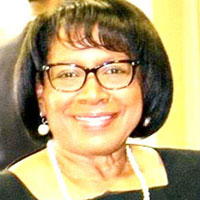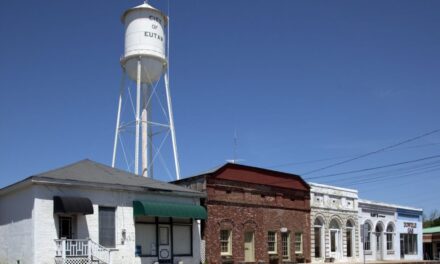Birmingham City Mayor Randall Woodfin, at microphone, surrounded by representatives from numerous agencies in support of a one-year re-entry pilot program to transform how the city serves people released from state prisons. (Barnett Wright, The Birmingham Times)
” data-medium-file=”https://www.birminghamtimes.com/wp-content/uploads/2024/05/City0502-1-300×225.jpg” data-large-file=”https://www.birminghamtimes.com/wp-content/uploads/2024/05/City0502-1-1024×768.jpg” />
By Barnett Wright | The Birmingham Times
In an extraordinary show of collaboration, more than a dozen area partners, including the City of Birmingham, on Wednesday launched a one-year re-entry pilot program to transform how the city serves people released from state prisons.
With a focus on quality housing and gainful employment, the Birmingham Re-entry Alliance will provide case management, and other services for 30-50 individuals in the inaugural year. Prospective participants will enroll as soon as they leave state prison, either through parole, mandatory early release, or at the end of their sentence.
“We believe that those who have paid their debt to society deserve the same basic living essentials of housing and gainful employment as any of us,” said Birmingham Mayor Randall L. Woodfin. “Together, with our partners, we plan to support them in returning into a welcoming community. We are committed to decreasing their recidivism and increasing their restoration.”
The pilot is being funded with $100,000 from the Regions Foundation; $50,000 from the Community Foundation of Greater Birmingham and supported by diverse groups that include the Alabama Appleseed Center for Law & Justice, a legal non-profit that assisted in the creation of the Alliance; Offender Alumni Association, which is providing peer support and Alabama Regional Medical Services (ARMS), which is offering health care.
Carla Crowder, executive director of Alabama Appleseed, said the program not only is about “second chances” but also about how the city “is being smart on public safety. Birmingham is both a forgiving and welcoming city,” Crowder said. “Birmingham is smart about public safety because if people don’t have their needs met, if they are hungry, if they are unsheltered, if they don’t have a good job coming out of the Department of Corrections, that’s not good for public safety.”
Marta Self, executive director of the Regions Foundation, a nonprofit primarily funded by Regions Bank, said her organization supports a wide range of partners who help advance education, workforce development and other areas in the wider community.
“Let’s think about that word – community …” she said. “What is taking place here is not only about helping people with re-entry … It’s providing a community of support – people who will walk alongside them to give them the tools and insights they need to prosper …”
She added, “It’s about moving beyond the past – and recognizing that where you’ve been doesn’t have to determine where you’re going … That’s where this work comes in … equipping and empowering people with proper tools in writing a better chapter.”
Having a strong, healthy supportive structure in place, and resources readily available is a vital component for a successful transition from incarceration, said Dena Dickerson, Chief Operating Officer at the Offender Alumni Association, a peer-led non-profit that does peer navigation and support work.
“Re-entry looks different for everyone,” she said. “We look at the whole person, while working with individuals from a person-centered place and wrapping services around them, in real time has been our re-entry navigation model.”
Pointing to all the partners gathered at the Offender Alumni Association offices on Wednesday, including City Councilor LaTonya Tate, chair of the city’s Public Safety Committee, Woodfin said, “Every single person that you see represented here … collectively believes in second chances. We believe that every person should be given the opportunity to be bigger than their past, to contribute to their communities and provide for their families. We believe that the spirit of forgiveness should be more than a buzzword. It should be an action item for all of us.”
The Alliance Partners include:
- Salvation Army, offering job training and workforce development
- Community on the Rise, assisting with identification and government documents
- Hope Inspired Ministries, providing life skills training and job placement
- Jimmie Hale Mission, offering its Reclaiming Hope Program
- Aletheia House, providing substance use treatment services
- Canterbury United Methodist Church, developing welcome home starter kits
- Housing Authority of the Birmingham District (HABD), providing housing vouchers










